Gardening in Forest Lake: Cultivating Green Spaces in Your Community
Introduction to Gardening in Forest Lake
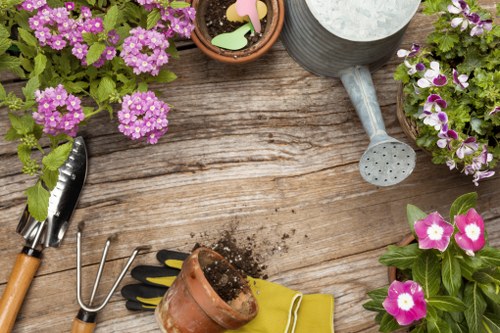
Gardening in Forest Lake offers residents a unique opportunity to create vibrant, sustainable, and beautiful outdoor spaces. Whether you're a seasoned gardener or just starting, Forest Lake provides the ideal environment with its rich soil, favorable climate, and supportive community resources.
Forest Lake boasts a diverse range of plants that thrive in its environment, making it a perfect place for horticultural enthusiasts. From colorful perennials to sturdy shrubs, the options are endless.
Engaging in gardening not only enhances the aesthetic appeal of your property but also contributes to the overall well-being of the community. It fosters a sense of accomplishment and provides a peaceful retreat from the hustle and bustle of daily life.
Planning Your Garden
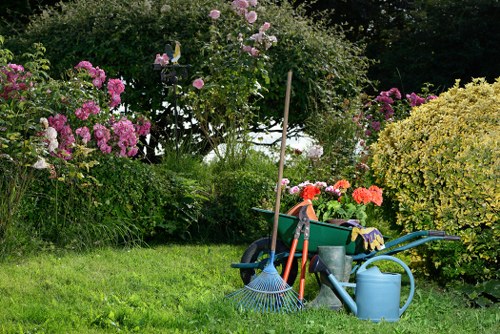
Effective planning is crucial for a successful garden. Begin by assessing your Garden Space, taking note of sunlight exposure, soil quality, and drainage. Forest Lake's climate is conducive to a variety of plants, but understanding your specific microclimate will help in selecting the right flora.
Soil Preparation is another essential step. Enrich your garden beds with compost and organic matter to improve soil structure and fertility. Testing your soil's pH can also guide you in choosing plants that will thrive.
Consider creating a Garden Layout that maximizes space and ensures good air circulation. Incorporate pathways, seating areas, and focal points such as a water feature or a specimen tree to enhance the garden's functionality and beauty.
Choosing the Right Plants
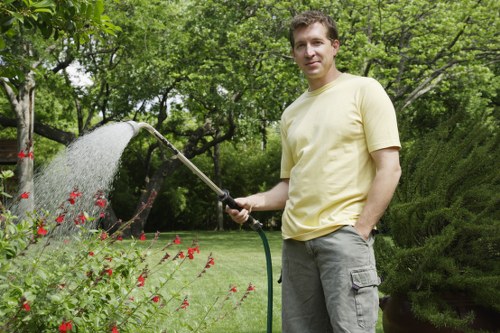
Selecting the appropriate plants is vital for a thriving garden. Forest Lake's climate supports a wide range of plant species, including native and drought-resistant varieties that require minimal maintenance.
Perennials like daylilies and hostas are excellent choices for adding long-lasting color. Annuals such as marigolds and petunias can provide vibrant seasonal blooms.
Trees and Shrubs offer structure and variety. Popular options include maples, which provide stunning fall foliage, and hydrangeas, known for their large, beautiful blooms.
Soil Health and Maintenance
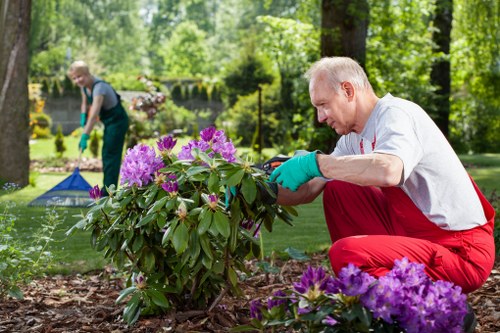
Maintaining healthy soil is the foundation of a successful garden. Regularly add organic matter to improve soil fertility and structure. Mulching helps retain moisture, suppress weeds, and regulate soil temperature.
Composting is an eco-friendly way to recycle kitchen and garden waste, enriching your soil with essential nutrients. It reduces the need for chemical fertilizers and enhances the overall health of your plants.
Implementing Crop Rotation can prevent soil depletion and reduce the risk of pests and diseases. Rotate different plant families in your garden beds each season to maintain soil balance.
Irrigation and Water Management
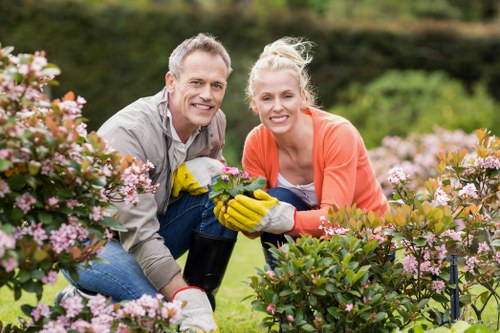
Proper irrigation is essential for plant health. Forest Lake's climate allows for efficient water management practices that conserve resources while ensuring your garden receives adequate moisture.
Drip Irrigation systems are an excellent choice for conserving water and delivering it directly to the plant roots. This method minimizes evaporation and reduces water waste.
Consider installing a Rainwater Harvesting system to collect and store rainwater for garden use. This sustainable practice not only conserves water but also lowers your gardening costs.
Pest and Disease Control
Protecting your garden from pests and diseases is crucial for its longevity. Integrated Pest Management (IPM) strategies can effectively manage pests while minimizing environmental impact.
- Biological Control: Introduce natural predators such as ladybugs to control aphids.
- Organic Pesticides: Use neem oil or insecticidal soap to manage infestations without harming beneficial insects.
- Healthy Practices: Maintain plant health through proper watering and soil management to reduce susceptibility to pests and diseases.
Regular monitoring and early intervention can prevent minor issues from becoming major problems, ensuring a healthy and thriving garden.
Seasonal Gardening Tips
Gardening in Forest Lake requires adapting to seasonal changes to maintain a vibrant garden year-round. Each season presents unique challenges and opportunities for growth.
- Spring: Prepare garden beds, plant early vegetables, and start seeds indoors.
- Summer: Focus on watering, weeding, and harvesting crops regularly.
- Fall: Plant perennials, clean up garden debris, and prepare for winter by mulching.
- Winter: Protect plants from frost, plan next year's garden, and maintain tools.
By following seasonal guidelines, you can ensure continuous growth and beauty in your garden.
Community and Resources in Forest Lake
Forest Lake offers a wealth of resources for gardeners, fostering a supportive community that shares knowledge and experiences.
- Local Nurseries: Access a variety of plants and gardening supplies suited to the Forest Lake climate.
- Workshops and Classes: Learn new gardening techniques and stay updated on best practices.
- Community Gardens: Collaborate with fellow gardeners, share resources, and participate in community projects.
Engaging with local gardening groups can enhance your gardening skills and provide a network of support.
Top 15 Nearby Areas to Forest Lake for Gardening Services
- Maple Grove: Known for its extensive nurseries and gardening centers.
- Woodbury: Offers a variety of community gardens and green spaces.
- Mendota Heights: Features specialized gardening workshops and classes.
- Buffalo: Home to several botanical gardens and plant enthusiasts.
- Ham Lake: Provides numerous parks and gardening resources.
- White Bear Lake: Known for its waterfront gardens and unique plant selections.
- Big Lake: Offers a range of gardening services and landscaping options.
- River Falls: Features fertile soil ideal for diverse plantings.
- Eagan: Hosts annual gardening fairs and community planting events.
- Shakopee: Provides extensive gardening supplies and expert advice.
- Saint Michael: Known for its family-friendly gardening projects.
- Austin: Offers sustainable gardening practices and organic options.
- Mahtomedi: Features beautiful residential gardens and landscaping services.
- Kort Hill: Known for its well-maintained public gardens and green initiatives.
- Blooming Prairie: A favorite for hobby gardeners and flower enthusiasts.
Each of these areas provides unique features and resources that complement gardening efforts in Forest Lake, making them excellent options for sourcing materials, inspiration, and support.
Maintaining Your Garden Year-Round
Consistent maintenance is key to a flourishing garden. Regular tasks include watering, pruning, weeding, and monitoring for pests and diseases.
Watering Schedule: Establish a consistent watering routine that meets your plants' needs without overwatering.
Pruning Techniques: Regularly trim and shape plants to promote healthy growth and enhance their appearance.
Eco-Friendly Gardening Practices
Adopting eco-friendly practices can make your garden more sustainable and beneficial for the environment. Implementing techniques such as composting, using organic fertilizers, and conserving water can significantly reduce your garden's ecological footprint.
- Composting: Turn kitchen scraps and garden waste into nutrient-rich compost to enhance soil health.
- Organic Fertilizers: Utilize natural fertilizers to nourish your plants without harmful chemicals.
- Water Conservation: Implement rainwater harvesting and drip irrigation systems to minimize water usage.
These practices not only benefit your garden but also contribute to the broader goal of environmental sustainability.
Garden Design Ideas
Creativity in garden design can transform your outdoor space into a personal oasis. Consider incorporating elements such as themed plantings, sculptures, or water features to add interest and personality.
- Butterfly Garden: Plant nectar-rich flowers to attract butterflies and other pollinators.
- Herb Garden: Grow a variety of herbs for culinary and medicinal uses.
- Rock Garden: Use rocks and drought-resistant plants to create a low-maintenance garden.
- Vertical Garden: Maximize space by growing plants vertically on walls or trellises.
- Water Garden: Incorporate ponds or fountains to add a tranquil water element.
Experimenting with different design ideas can make your garden more engaging and enjoyable.
Conclusion: Embrace Gardening in Forest Lake
Gardening in Forest Lake is a rewarding endeavor that enhances both personal well-being and community beauty. By selecting the right plants, maintaining healthy soil, and adopting sustainable practices, you can create a thriving garden that stands the test of time.
Contact us today to begin your gardening journey in Forest Lake. Whether you're looking for professional landscaping services or seeking advice on starting your own garden, our experts are here to help you cultivate the green space of your dreams.
Book your service now and join the vibrant community of gardeners in Forest Lake who are making a difference, one plant at a time.
